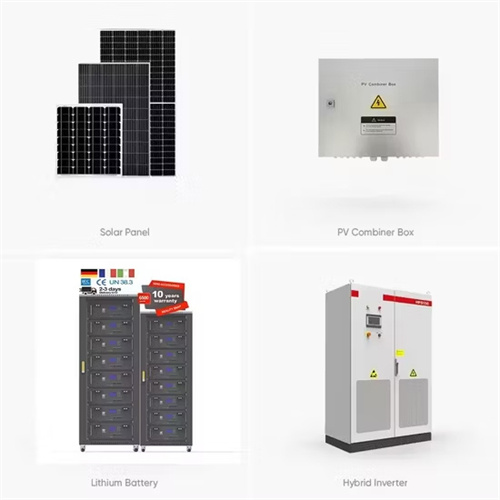Advantages and disadvantages of flexible soft film photovoltaic panels

Advantages and Disadvantages of Solar Energy
Let''s explore the key advantages and disadvantages of solar energy today. Advantages of Solar Energy 1. Reduced green house gases. The first and foremost advantage of solar energy is that, beyond panel production,

Flexible Solar Panels: Pros, Cons, and Buying Guide
In this guide, we''ll look at what flexible solar panels are, how they''re used, the advantages and disadvantages compared to rigid panels, and provide a guide so you know what to consider about flexible solar panels.

Flexible Solar Panels: Application and Helpful Buying Tips
Key advantages and disadvantages of flexible solar panels. Here, you may be surprised that there are as many advantages as there are disadvantages (or perhaps limitations with present technology). Highlights are

The Advantages and Disadvantages of Solar Energy | Earth
While many nations are starting to recognise the vast potential of solar energy – a powerful and extremely beneficial renewable source – there are still some downsides to it. We

Flexible Solar Panels: Everything You Need To Know
A flexible solar panel setup is usually best for on-the-go solar power instead of as a permanent home solar solution. When you''re out on the trail, camping, or driving long distances, having a durable, lightweight, and

Advantages & disadvantages of solar energy
What are the disadvantages of solar energy? While solar energy has many advantages, there are also some drawbacks. Here''s a quick look at the main points: The initial cost of solar energy can be high. The biggest hurdle for

21 Pros and Cons of Photovoltaic Cells: Everything You Need to
Solar power lacks the costs of extraction processing and burning of fossil fuels so the overall cost of electricity is much lower. The low cost of solar energy has accelerated its

What Are Flexible Solar Panels? The Lightweight Alternative Solar
In thin-film solar panels, the layers of photovoltaic materials are much thinner and, therefore, sometimes flexible. Watch this: New Solar Shingles You May Not Even Notice 11:13

Pros and Cons of Flexible Solar Panels
Flexible solar panels offer lightweight, portable, and versatile solutions, making them ideal for various applications, from camping trips to irregular surfaces. Despite their advantages, flexible panels have drawbacks, including lower

Advantages and Disadvantages of Thin Film Solar Cells
Thin-film solar cells are a type of photovoltaic technology that differs from traditional crystalline silicon solar cells. They are made by depositing one or more thin layers of semiconductor materials onto a substrate. Here are

Advantages and disadvantages of a photovoltaic plant
A photovoltaic plant has several advantages and disadvantages. Other types of solar panels are polycrystalline or thin film. The latter type is less expensive to produce but less effective.

Thin Film Solar Cells Advantages and Disadvantages:
Thin film solar cells have several advantages, including being lightweight, flexible, and cost-effective in terms of materials and energy consumption due to their thin and uniform structure. However, they also have

6 FAQs about [Advantages and disadvantages of flexible soft film photovoltaic panels]
Are flexible thin film solar panels a good choice?
Flexible thin film panels are lightweight and durable and can be a great option, depending on your solar needs. To learn more about solar panel manufacturers focusing on flexible products, check out our company reviews on Sunflare and MiaSolé, two companies innovating in the flexible solar space.
What are the disadvantages of flexible solar panels?
Disadvantages of Flexible Solar Panels 1. Cost One of the main drawbacks of flexible solar panels is their higher cost compared to rigid panels. The advanced technology required to produce flexible panels contributes to their higher price point, making them less accessible for those on a tighter budget.
How efficient are flexible solar panels?
Flexible solar panels typically have an efficiency rating between seven and 15 percent. Use the EnergySage Marketplace to learn more about your solar options! There are very few (if any) solar installers who offer flexible panels as part of a rooftop or ground-mounted system.
What are flexible solar panels?
Flexible solar panels, also known as thin-film solar panels, are a lightweight and portable alternative to traditional rigid solar panels. These panels are made up of ultra-thin silicon cells, typically just a few micrometers wide, sandwiched between layers of protective plastic.
What are the disadvantages of flexible solar panels for RV use?
When talking about flexible solar panels for RV use specifically, other disadvantages include cupping, pooling, scratching, gouging, and lack of adjustability, as outlined by Gone With The Wynns. Who Makes The Best Flexible Solar Panels?
What are the best applications for flexible solar panels?
The best application for flexible solar panels is when you need a portable solar solution. Products like the Winnewsun Flexible Solar Panel are one way to generate solar power on the go, like on the roof of an RV. Foldable solar panels, like the SUAOKI Solar Charger, can also be a good choice.
Related Contents
- Advantages and disadvantages of adhesive flexible photovoltaic panels
- Advantages and disadvantages of single crystal and polycrystalline photovoltaic panels
- Advantages and disadvantages of wave-shaped photovoltaic panels
- Flexible photovoltaic panels and traditional photovoltaic panels
- Light flexible photovoltaic panels
- Why can flexible photovoltaic panels be bent
- Disadvantages of solar panels and photovoltaic panels
- Standard value of power generation rate of flexible photovoltaic panels
- Which company s flexible photovoltaic panels are made in
- What is the explanation of flexible photovoltaic panels
- Do flexible photovoltaic panels have high process requirements
- Hanergy thin film photovoltaic panels for sale